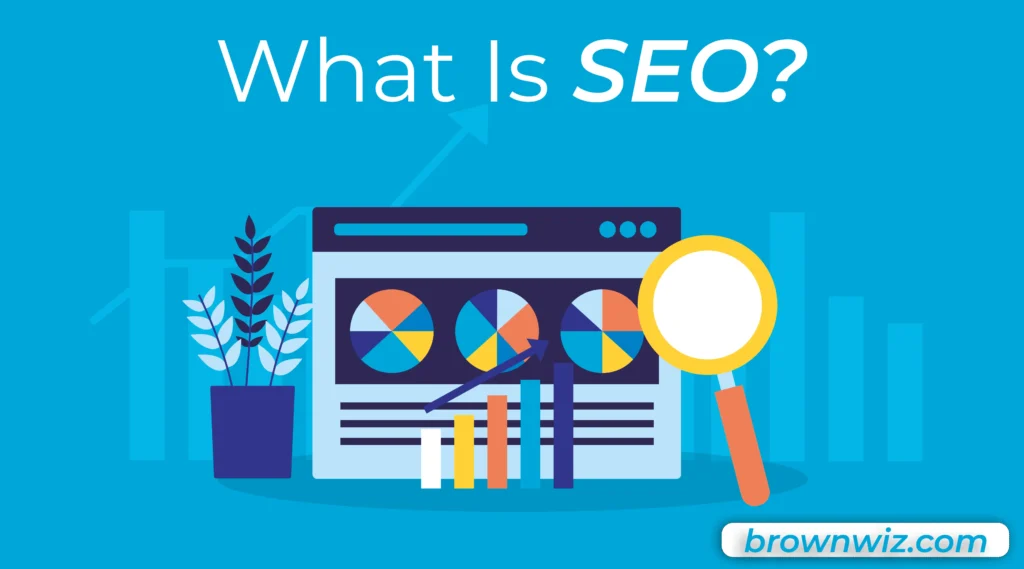Search engine optimization (SEO) is the process of optimizing a website to improve its ranking on search engine results pages (SERPs) and drive more traffic to the site.
It’s all about improving the quality and relevance of your website’s content and structure so that it appears higher in search results.
As the internet continues to grow, the competition for online visibility has become increasingly fierce.
Search engine optimization (SEO) is a vital strategy for businesses looking to improve their online presence and gain more organic traffic.
In this article, we will explore what SEO is and how it can help your website rank higher in search engine results pages (SERPs).

What is SEO?
SEO is the practice of optimizing your website and its content to increase its visibility and ranking in search engine results.
This involves a range of techniques and strategies, including keyword research, on-page optimization, link building, and content creation, all to improve your website’s relevance and authority in the eyes of search engines like Google, Bing, and Yahoo.
Understand SEO Step-By-Step
In this section, you can break down the components of SEO, such as on-page optimization, off-page optimization, and technical optimization.
Explain how these factors help search engines understand the relevance and authority of a website.
Start with the basics
SEO stands for search engine optimization, which is the process of optimizing your website to rank higher in search engine results pages (SERPs) for relevant keywords. Start by understanding the fundamentals of how search engines work, and how they decide which pages to show for a given search query.
Keyword Research
The first step in any SEO strategy is keyword research. You need to understand what keywords your target audience is searching for, and what the competition looks like for those keywords. Use keyword research tools like Google Keyword Planner, Ahrefs, or SEMrush to identify high-volume, low-competition keywords that you can target. Keyword research is a critical aspect of SEO. You can discuss the importance of researching relevant and high-volume keywords and how they can help improve a website’s search engine ranking.
Website Optimization
Once you have identified your target keywords, you need to optimize your website to rank for those keywords. This includes on-page optimization, which involves optimizing your page titles, meta descriptions, headings, and content for your target keywords. You should also make sure your website is mobile-friendly, loads quickly, and has a clean, easy-to-navigate design.
On-Page Optimization
In this section, you can explain the different on-page optimization techniques, such as optimizing page titles, meta descriptions, headers, content, and images. You can also mention the importance of optimizing for mobile devices and providing a positive user experience.
Off-Page Optimization
Off-page optimization is essential for building a website’s authority and credibility.
You can discuss how off-page optimization techniques such as link building, social media marketing, and influencer outreach can improve a website’s search engine ranking.
Technical Optimization
Technical optimization ensures that a website is technically sound and easily accessible to search engines. You can discuss the different technical optimization techniques, such as improving website speed, fixing broken links, and adding structured data.
Build high-quality backlinks
Backlinks are one of the most important ranking factors for SEO. They are links from other websites to your website, and they signal to search engines that your website is a trusted and authoritative source of information. To build high-quality backlinks, you should create high-quality content that people will want to link to, and you should also reach out to other websites in your niche to request backlinks.
Track your progress
Finally, it’s important to track your progress over time. Use tools like Google Analytics and Google Search Console to monitor your website’s traffic and rankings, and make adjustments to your SEO strategy as needed. This will help you identify what’s working, and what needs improvement, so you can continue to improve your website’s search engine visibility over time.
Measuring SEO Success
In this section, you can discuss the importance of tracking and measuring SEO success, such as monitoring website traffic, keyword rankings, and user engagement. You can also mention the different SEO tools available for businesses to track and measure their SEO success.

How to create an SEO Strategy?
To help you understand SEO better, let’s take a closer look at the different components that make up this important digital marketing strategy.
- Keywords are the foundation of any good SEO strategy. These are the words and phrases that people use to search for information on the internet. By including relevant keywords in your website’s content, you can make it more likely to show up in search results.
- Content is another critical component of SEO. Search engines prioritize high-quality, relevant content that provides value to the reader. This includes everything from blog posts and articles to product descriptions and landing pages.
- Links are also an essential part of SEO. When other websites link to your site, search engines view this as a vote of confidence in your content. The more high-quality links you have, the more likely you are to rank higher in search results.
- Site structure is another crucial element of SEO. Search engines look for well-organized, user-friendly websites that are easy to navigate. By optimizing your site structure, you can make it easier for search engines to crawl your site and rank your content.
Finally, technical SEO is all about making sure your website meets the technical requirements set by search engines. This includes everything from ensuring your site loads quickly to making sure it’s mobile-friendly.
So, how does SEO help you rank higher in search results?
By optimizing your website for keywords, creating high-quality content, building links, optimizing your site structure, and ensuring your site meets technical requirements, you can improve your search engine rankings and attract more traffic to your site.
Why is SEO important?
SEO is essential for businesses looking to establish an online presence and attract more potential customers. In today’s digital age, having a well-optimized website can mean the difference between success and failure.
According to recent statistics, 93% of online experiences begin with a search engine, and the top five organic results on the first page of Google receive 67% of all clicks.
How does SEO help rank websites?
SEO helps rank websites by optimizing them for relevant keywords and phrases that people use to search for information online.
By optimizing your website’s content with high-quality, relevant keywords and phrases, you can increase its relevance and authority, making it more likely to appear at the top of search engine results in pages.
One of the most critical factors in SEO is link building, which involves getting other high-quality websites to link back to your site.
This can be achieved by creating high-quality, original content that people want to share and link to, as well as through guest posting and other link-building strategies.
Another important factor in SEO is on-page optimization, which involves optimizing the content and structure of your website’s pages to improve their relevance and readability. This can include optimizing titles and meta descriptions, using header tags to structure content, and ensuring that your website is easy to navigate and use.
Benefits of SEO
The benefits of SEO are numerous and can have a significant impact on your business’s online success. By improving your website’s visibility and ranking in search engine results, you can attract more potential customers, increase brand awareness, and establish your business as an authority in your industry.
In addition, SEO is a cost-effective strategy that can provide long-term benefits and help you stay ahead of the competition.
If you are a beginner in Digital Marketing then check out our Beginner’s guide on Digital Marketing.
Conclusion
SEO is a critical strategy for any business looking to establish an online presence and attract more potential customers.
In conclusion, SEO is a vital component of any digital marketing strategy.
By optimizing your website for keywords, creating high-quality content, building links, optimizing your site structure, and ensuring your site meets technical requirements, you can improve your website’s ranking in search engine results and establish your business as an authority in your industry.
Also read our – SEO- HOW IT WORKS, WHY IT MATTERS, TYPES, RANKING FACTORS, AND EXAMPLE
What is the importance of SEO?
SEO is crucial for businesses because it helps their websites rank higher in search engine results, making it easier for potential customers to find them online. With higher visibility in search engines, businesses can drive more organic traffic to their websites, leading to increased brand awareness, more leads, and ultimately, higher sales and revenue.
Why Is SEO Important?
SEO is important because it directly impacts a website’s ability to attract relevant traffic from search engines. By optimizing a website for search engines, businesses can improve their online presence, reach their target audience more effectively, and stay ahead of their competitors in the digital landscape.
What is SEO and how does it work?
SEO (Search Engine Optimization) is the process of optimizing a website to rank higher in search engine results for specific keywords and phrases. It works by leveraging various techniques, such as keyword research, on-page optimization, technical SEO, link building, and content creation, to make a website more search engine-friendly and relevant to users’ search queries.
What are the SEO strategies?
SEO strategies involve a combination of on-page optimization (optimizing website content and structure), off-page optimization (link building and online reputation management), and technical SEO (ensuring website speed, mobile-friendliness, and crawlability). Additionally, strategies may include content marketing, local SEO, and staying up-to-date with search engine algorithm updates.
How many types of SEO are there?
There are three main types of SEO: on-page SEO, off-page SEO, and technical SEO. On-page SEO focuses on optimizing website content and structure, off-page SEO involves link building and online reputation management, and technical SEO ensures website speed, mobile-friendliness, and crawlability for search engines.

Pingback: SEO- How It Works, Why It Matters, Types, Ranking Factors, And Example